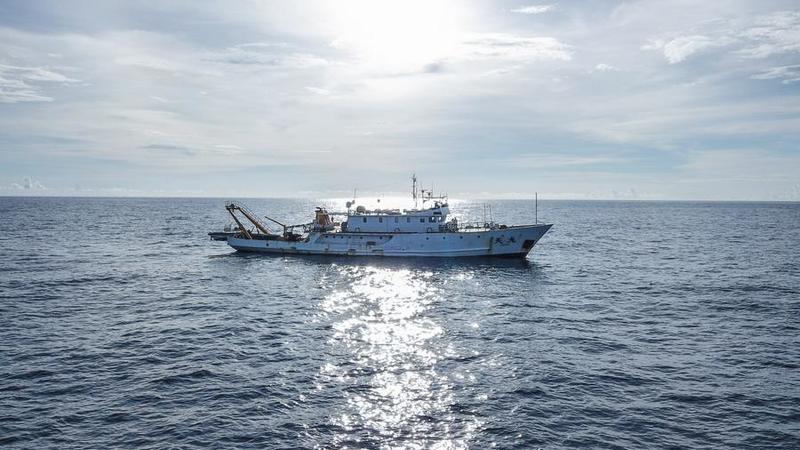 This file photo dated July 13, 2020 shows an expedition vessel in the South China Sea. (PHOTO / XINHUA)
This file photo dated July 13, 2020 shows an expedition vessel in the South China Sea. (PHOTO / XINHUA)
BEIJING — China lodged serious representations to the Philippine side on its intruding vessels into the adjacent waters of Ren'ai Jiao, and once again urges the Philippines to stop maritime infringement and provocation, foreign ministry spokesperson Mao Ning said on Tuesday.
Mao made the remarks at a regular news briefing when asked to comment on the collision between Chinese and Philippine boats in the South China Sea.
Mao added that China's above-mentioned sovereignty, rights and interests in the South China Sea were established in the long course of history, and are solidly grounded in history and the law, which are in compliance with the UN Charter and international law
Mao said that on March 5, two supply vessels and two Coast Guard vessels of the Philippines, without permission from the Chinese government, intruded into the adjacent waters of Ren'ai Jiao of China's Nansha Qundao, in an attempt to send materials, including construction materials, to the vessel illegally grounded at Ren'ai Jiao.
READ MORE: China 'takes control measures' against illegal Philippine vessels
China Coast Guard took necessary measures toward the Philippine vessels in accordance with law. The actions taken at the scene were professional, restrained, justified and lawful, Mao added.
"The Chinese Foreign Ministry has lodged serious representations to the Philippine side to express our strong protest," said Mao.
China's position on the issue of Ren'ai Jiao is consistent and clear, Mao said, adding that for some time, China and the Philippines have maintained communication on properly managing the situation at Ren'ai Jiao. The Philippines once again broke its promise to China by making infringement and provocations, and creating trouble in the waters of Ren'ai Jiao, seriously violating China's territorial sovereignty and maritime rights and interests.
"China once again urges the Philippines to stop maritime infringement and provocation, and refrain from taking any action that may complicate the situation at sea. China will continue to firmly safeguard our territorial sovereignty and maritime rights and interests in accordance with domestic and international laws," said the spokesperson.
China firmly opposes the Senate of the Philippines approving the "Maritime Zones Act" and has lodged solemn démarches to the Philippines.
Mao said China noticed the relevant developments. The "Maritime Zones Act" approved by the Senate of the Philippines has attempted to further enforce the illegal arbitral award on the South China Sea by domestic legislation and include China's Huangyan Dao, most islands and reefs of China's Nansha Qundao, and their adjacent waters into its maritime zones, which severely violates China's territorial sovereignty and maritime rights and interests in the South China Sea.
"China firmly opposes it and has lodged solemn démarches to the Philippines," she stressed. Mao reaffirmed China's position as follows:
First, China has sovereignty over Nansha Qundao, Zhongsha Qundao, including Huangyan Dao, and their adjacent waters, and has sovereign rights and jurisdiction over relevant waters.
Mao added that China's above-mentioned sovereignty, rights and interests in the South China Sea were established in the long course of history, and are solidly grounded in history and the law, which are in compliance with the UN Charter and international law, including the United Nations Convention on the Law of the Sea (UNCLOS).
The Philippines arbitrarily went beyond its territorial scope to set up the so-called "Kalayaan Island Group," which has violated China's territorial sovereignty. This is illegal, null and void
Second, the territory of the Philippines is defined by a series of international treaties. China's Huangyan Dao and other islands and reefs of Nansha Qundao are completely beyond the limits of the Philippines' territory. The Philippines' illegal occupation of Mahuan Dao, Feixin Dao, Zhongye Dao, Nanyao Dao, Beizi Dao, Xiyue Dao, Shuanghuang Shazhou and Siling Jiao in China's Nansha Qundao severely violates international law, including the UN Charter.
The Philippines arbitrarily went beyond its territorial scope to set up the so-called "Kalayaan Island Group," which has violated China's territorial sovereignty. This is illegal, null and void, Mao said.
Third, without the Chinese government's prior consent, the Philippines unilaterally initiated an international arbitration, which violated international law, including UNCLOS. The arbitral tribunal in the South China Sea arbitration handled the case ultra vires and made an illegitimate ruling.
"The rendered award is illegal, null and void. China neither accepts nor participates in that arbitration, neither accepts nor recognizes the award, and will never accept any claim or action arising from the award," Mao said, adding that China's territorial sovereignty and maritime rights and interests in the South China Sea will not be affected by the award in any way.
READ MORE: Philippines slammed for holding joint patrols in South China Sea
Fourth, territorial sovereignty is the precondition and foundation for the generation of maritime rights and interests. Under the pretext of implementing UNCLOS, the Philippines has advanced the legislation of the "Maritime Zones Act" in an attempt to put a legal veneer on its illegal claims and actions in the South China Sea.
Such an "Act" goes against the provisions of international law, including the UN Charter and UNCLOS, and against the spirit of the Declaration on the Conduct of Parties in the South China Sea. This completely horrendous act will inevitably make the situation in the South China Sea more complex, said Mao.
Fifth, China urges the Philippines to respect China's territorial sovereignty and maritime rights and interests in good faith, immediately end any unilateral move that may escalate the dispute and complicate the situation, return to the right track of properly settling differences through negotiation and consultation as soon as possible and work with China to uphold the larger interest of the bilateral relations and keep the South China Sea peaceful and stable.



